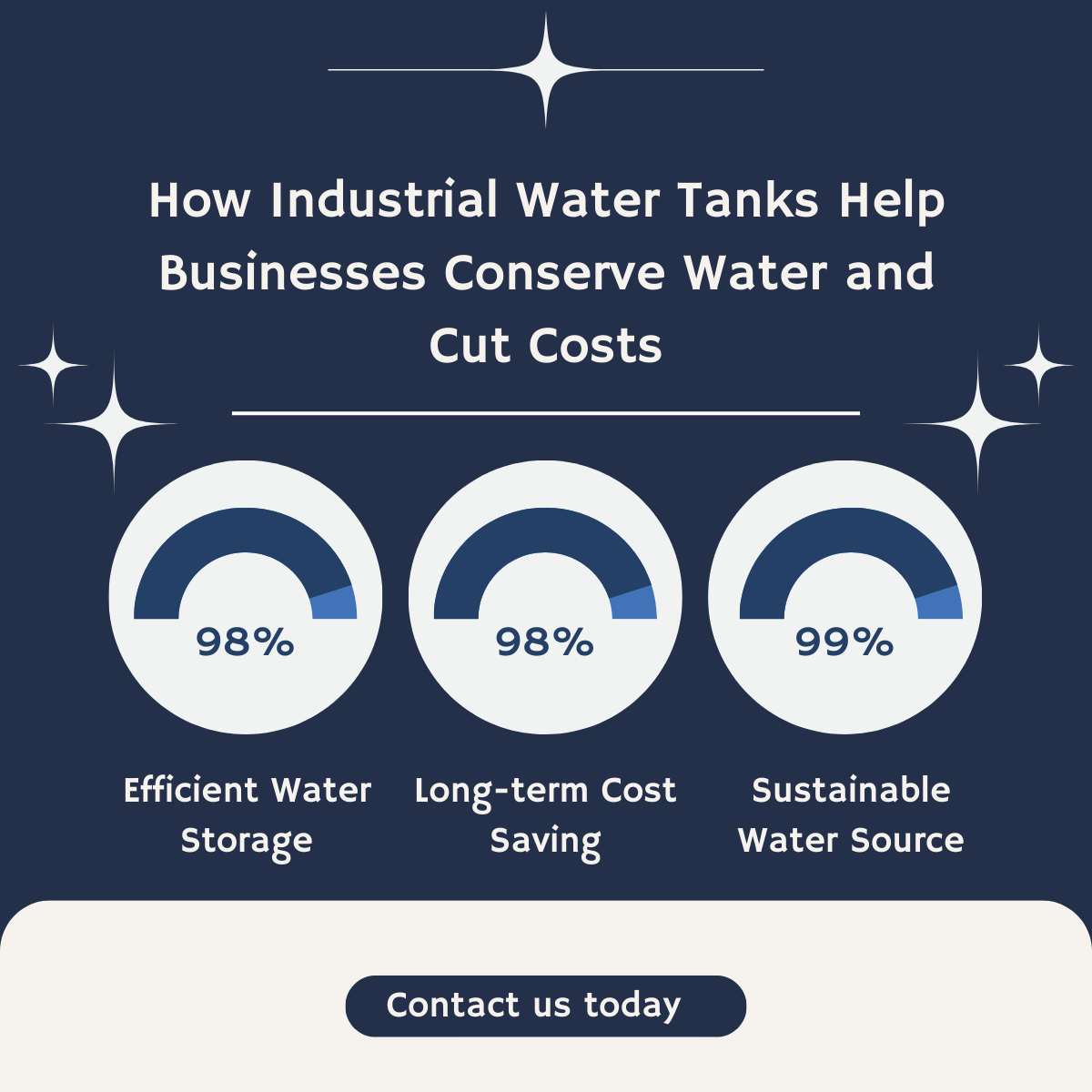Water is one of the most vital resources for industries across the globe, playing a critical role in manufacturing, cooling, cleaning, and various other processes. However, as water scarcity becomes a growing concern and utility costs continue to rise, businesses are increasingly seeking ways to conserve water and reduce expenses. One highly effective solution is the use of industrial water tanks.
In this blog post, we’ll explore how industrial water tanks can help businesses conserve water and cut costs, offering both environmental and financial benefits.
1. Efficient Water Storage for Peak Demands
Industrial water tanks provide businesses with a reliable way to store large quantities of water, ensuring that they have an uninterrupted supply even during periods of high demand or water shortages. This allows companies to avoid relying solely on municipal water systems, which can be costly during peak usage times.
By storing water during periods of lower demand, businesses can ensure they have adequate reserves to support their operations when water is scarce or expensive. This reduces reliance on external water sources, helping businesses control costs and ensure a steady supply of water for critical processes.
2. Rainwater Harvesting: A Sustainable Water Source
One of the most environmentally friendly and cost-effective ways to conserve water is through rainwater harvesting. Industrial water tanks can be used to capture and store rainwater, which can then be treated and reused for various industrial processes.
Rainwater harvesting helps businesses reduce their dependence on mains water and provides a sustainable, cost-free source of water. This can be especially beneficial for industries located in areas with frequent rainfall or for those looking to implement environmentally conscious water management practices.
Benefits of rainwater harvesting with industrial water tanks include:
- Reducing water bills by using free, naturally occurring water
- Lessening the strain on municipal water supplies
- Supporting environmental sustainability goals
3. Recycling and Reusing Process Water
Industrial processes such as manufacturing, cleaning, and cooling often generate large amounts of water that can be treated and reused. Industrial water tanks allow businesses to capture and store this used water, enabling them to implement water recycling systems.
By installing filtration or treatment systems alongside industrial water tanks, businesses can recycle process water and use it for non-potable applications such as cooling, equipment washing, or irrigation. This reduces the need to purchase fresh water, significantly cutting down on operational water costs.
Advantages of recycling process water include:
- Minimizing waste and lowering water consumption
- Reducing the need for expensive water treatment from external sources
- Decreasing environmental impact by recycling water internally
4. Reducing Water Waste and Leakage
Water loss due to leaks or inefficient water management can drive up costs for businesses. Industrial water tanks help address this issue by enabling businesses to implement more controlled and efficient water management systems.
Tanks that are properly maintained and monitored can reduce water waste by ensuring that water is stored securely and transported efficiently throughout the facility. Furthermore, modern industrial tanks come with features such as level sensors and automated shutoff systems, helping businesses detect leaks early and take immediate action to prevent water loss.
By reducing water waste, businesses can:
- Lower water consumption and associated costs
- Avoid fines or penalties for water overuse or waste
- Increase overall operational efficiency
5. Compliance with Water Conservation Regulations
Many industries are required to adhere to strict water conservation regulations, especially in areas where water is scarce. Failing to comply with these regulations can lead to hefty fines, increased operational costs, or even shutdowns.
Industrial water tanks provide an effective solution for meeting regulatory requirements by enabling businesses to conserve water and implement efficient storage and reuse systems. By using water tanks for rainwater harvesting, water recycling, and leak prevention, businesses can ensure they are fully compliant with local and national water conservation laws.
Benefits of regulatory compliance:
- Avoiding costly fines and penalties
- Reducing risk of legal issues or operational interruptions
- Enhancing the company’s reputation for environmental responsibility
6. Long-Term Cost Savings
Investing in industrial water tanks may require an initial upfront cost, but the long-term financial savings can be substantial. By conserving water, reducing dependency on municipal supplies, and recycling process water, businesses can lower their water bills and reduce the costs associated with waste disposal and water treatment.
Moreover, as water prices continue to rise due to scarcity and increasing demand, businesses that have efficient water management systems in place will be better positioned to withstand these changes without significant increases in operational costs.
Key long-term cost benefits include:
- Reduced water bills and operational expenses
- Lower reliance on external water sources, protecting against price hikes
- Increased operational resilience in times of water scarcity
Conclusion: Investing in Industrial Water Tanks for Sustainability and Savings
Industrial water tanks are a powerful tool for businesses seeking to conserve water, reduce waste, and cut costs. From rainwater harvesting to water recycling, these tanks provide a versatile and sustainable solution for managing water resources more efficiently. By investing in water tanks, businesses can not only lower their utility bills but also contribute to a more sustainable future by reducing their environmental impact.
Whether you’re looking to store water for peak demand, implement a rainwater harvesting system, or recycle process water, industrial water tanks offer a cost-effective, long-term solution for smarter water management. As industries continue to face water shortages and rising costs, investing in a robust water conservation strategy is essential for staying competitive and sustainable in today’s market.
Interested in learning more about how industrial water tanks can help your business conserve water and save costs? Contact us today to explore the best options for your industry!
